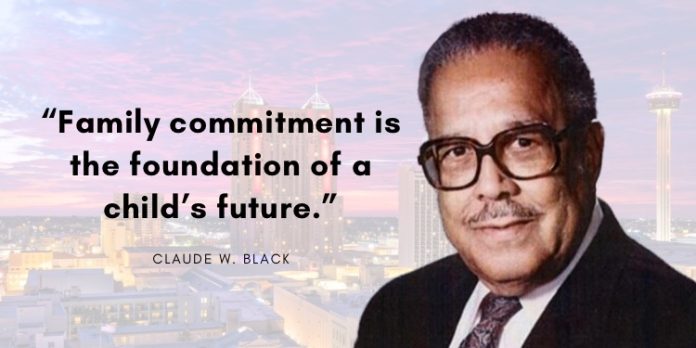Claude W. Black continues to be a living legend in the city of San Antonio. Even after his death people still honor his name and visit his gravesite, remembering his legacy and his uncompromising stance against white supremacy and injustice. Reverend Black was pastor of the historic Mount Zion First Baptist Church for 49 years before retiring. When once asked what he is most known for Reverend Black responded in his usual sincere yet jovial manner, “As Pastor of Mount Zion and sometimes as a political leader.” Reverend Black was perhaps one of the best City Councilman the city ever had. He represented his community at a time when African Americans were suffering from racial segregation at the hands of racist city leadership under the segregationist mayor Walter W. McAllister.
Reverend Black was a veteran of the Civil Rights Movement. He didn’t just march in the marches but supported and participated in the activities surrounding those perilous activities. He marched when it was not safe to do so and conducted the first march in San Antonio history for Martin Luther King. Claude Black supported the SNCC chapter (Student Non-Violent Coordinating Committee) when many in his congregation were opposed to. He was one of a handful of pastors in San Antonio that stood up to white supremacy in San Antonio in the most militant traditions of the black church. Rev Black stood up at the risk of physical harm to himself and his family and the Church was burned because of his efforts. On the occasion of his 90th Birthday Rev Black was honored by several well-known Civil Rights activists, including attorney Percy Sutton and well-known Civil Rights activist Fred Shuttlesworth, and myself for his contributions to the Civil Rights struggle.
Reverend Black said that his motivations stemmed from his desire to “serve the needs of the people and the community.” He was successful as a political leader and pastor. Reverend Black succeeded in helping to create a day care center and economic development programs. Always wanting to give others credit Reverend Black said, “We created economic development and also a place for the elderly through the church because the people needed it.” The driving force in his life Reverend Black maintained that, “Being able to respond as pastor of a church to the needs of people” is what drove him, and the fact that every pastor has a responsibility to the community. This was an important statement at a time when some “mega church” leaders did little or nothing to address the fight against homelessness and white supremacy and settled into their mansions, and big cars.
He was forever the optimist. Pastor Black said that he woke up each morning “With great expectations, and with the idea that great things are going to happen that day.” He once said that the sacrifices in his life were made by his parents who sacrificed so that he would have an education. To this end he said that, “Family commitment is the foundation of a child’s future.” Reverend Black maintained that it was a great personal accomplishment to serve the Mt. Zion First Baptist Church community, and also to serve the community at large as a San Antonio City Councilman. When talking about what we should do for young African Americans he is quite clear. He advised that young African Americans “Should accept the responsibility of new opportunities that the country will give you, because we have made those opportunities through struggle. Accept these challenges for your future.”








